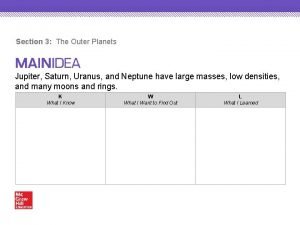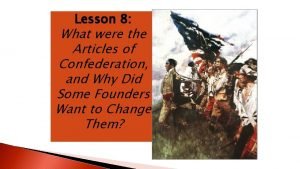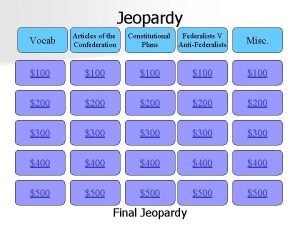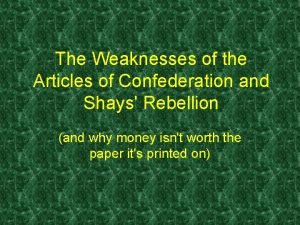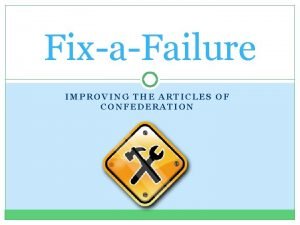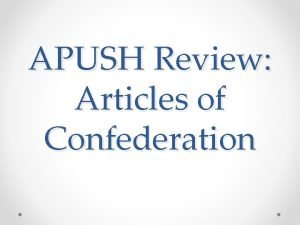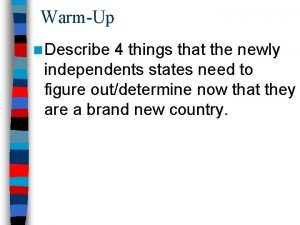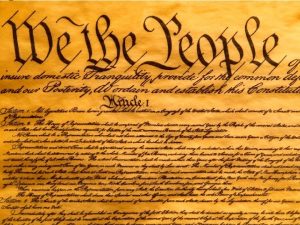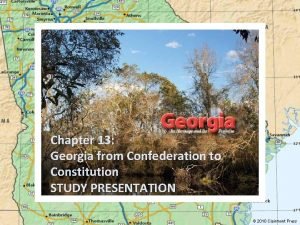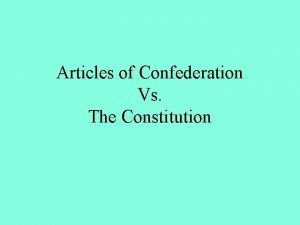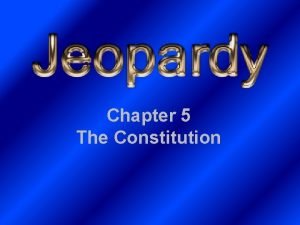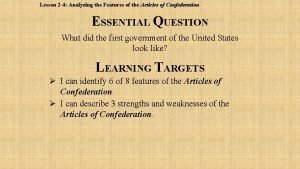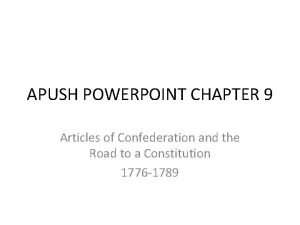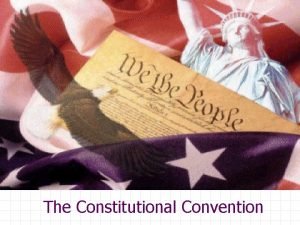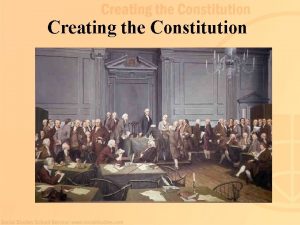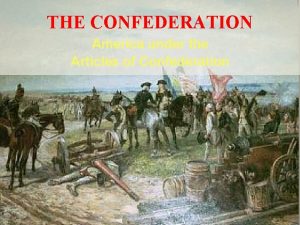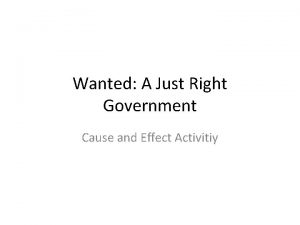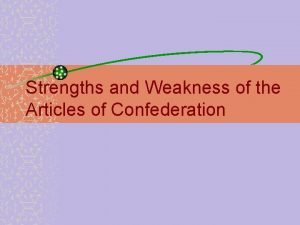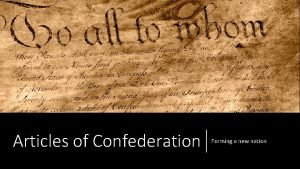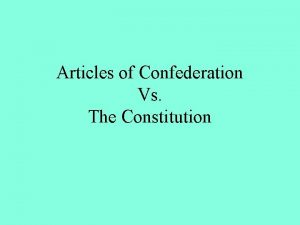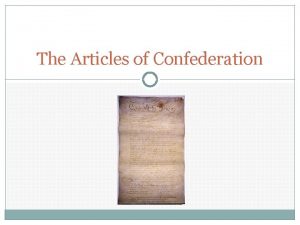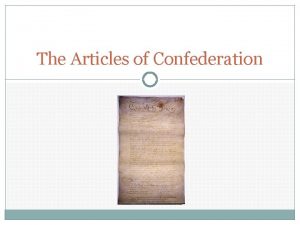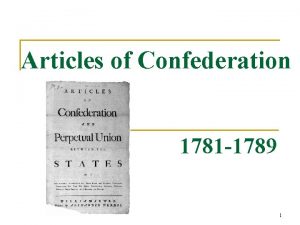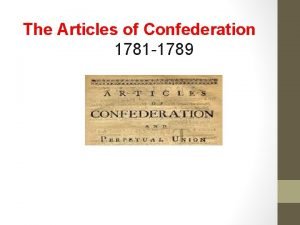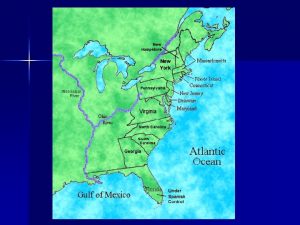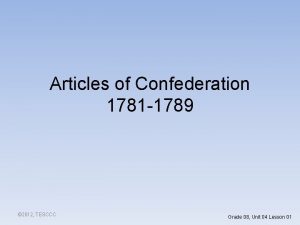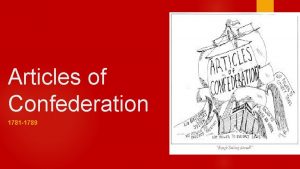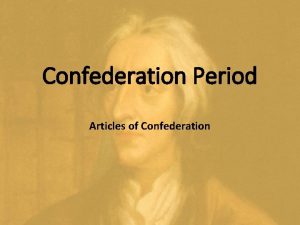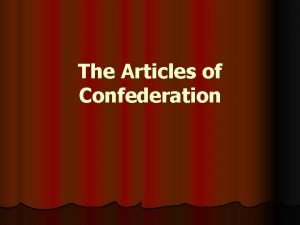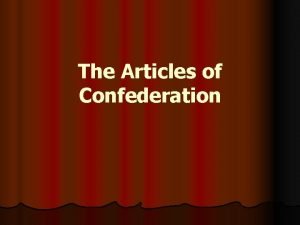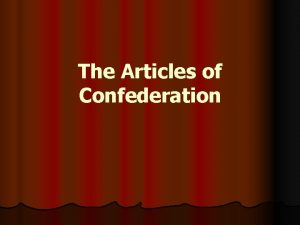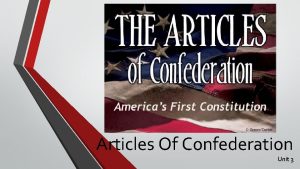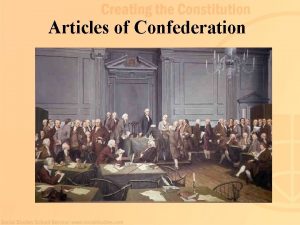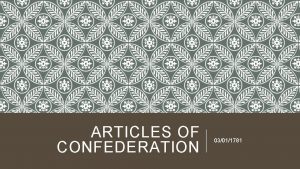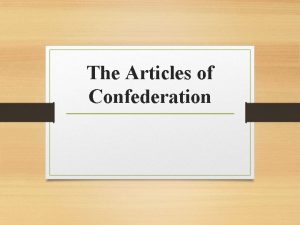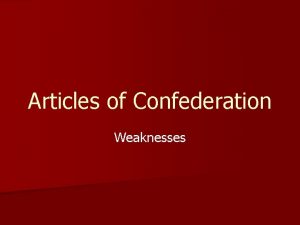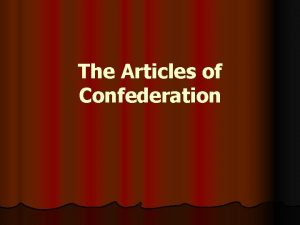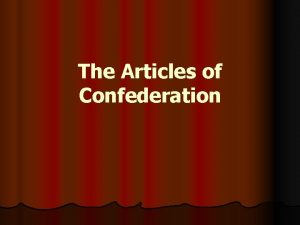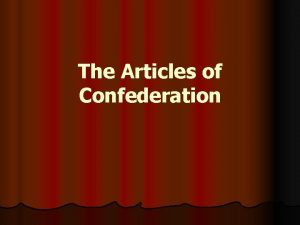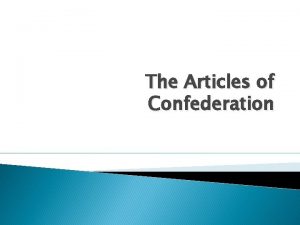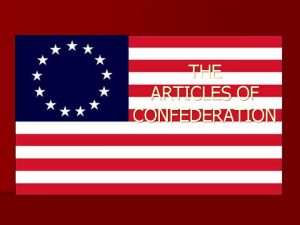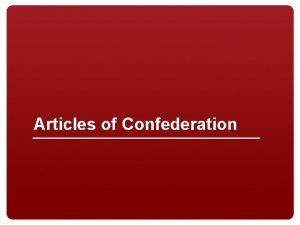Articles of Confederation 1781 1789 AKA Articles of
























- Slides: 24

Articles of Confederation 1781 -1789 AKA “Articles of Confusion”

Articles of Confederation ü U. S. ’s 1 st written constitution. ü Written by John Dickinson from the 2 nd Continental Congress. ü Influenced by the Iroquois and their confederacy.

Articles of Confederation ü After a king – the Articles reflected the colonist’s fear of a strong central government. ü Gave the states all the power. ü Summary: Weak national government, strong state government. üSTATES > FEDERAL

Articles of Confederation ü ü Articles set up a firm league of friendship among the 13 states. States did their own thing while the Federal government did very little. ü United States of America? OR ü Separate States of America!

It could: ü Regulate weights and measures ü Create Post Offices ü Coin and Borrow Money ü Direct Foreign Affairs ü Declare War / Make Peace ü Build and Equip a Navy ü Ask States to Provide Recruits & Money for an Army

No Enforcement? ü NO CHIEF EXECUTIVE! ü Articles were purposely designed NOT to have an executive as part of a strong central government. ü Right away the Articles weren’t working: o “Separate States of America”

No Taxation/Regulation? ü No Federal Taxation ü The AOC could ask for tax money from the states, but the states were not required to provide income. ü No Regulation of Trade ü The AOC could not prevent trade wars between states. o “Separate States of America”

Congressional Supermajority? ü The Federal Congress was comprised uni-cameral. ü In order pass new laws, it needed 9 out of 13 states to agree. ü In order to change the original constitution, the vote had to be unanimous.

Achievements Under the Articles 1. A good start for a new nation. 2. Successfully ended the Revolutionary War (Treaty of Paris). 3. Land Ordinance of 1785. n Set up the process for territories to become new states and join the Union. 4. Northwest Ordinance of 1787. n Prohibited slavery in all of the lands of the Northwest Territory.

Preamble to Constitution

Preamble to Constitution 1. What is a preamble? üA preliminary statement, especially the introduction to a formal document that serves to

Preamble to Constitution Read the Preamble. What are the FIVE goals identified in the Preamble to the Constitution?

We the People of the United States, in Order to form a more perfect Union, establish Justice, insure domestic Tranquility, provide for the common defence, promote the general Welfare, and secure the Blessings of Liberty to ourselves and our Posterity, do ordain and establish this Constitution for the United States of America. http: //www. youtube. com/watch? v=30 Oy. U 4 O 80 i 4

THE PREAMBLE TO THE UNITED STATES CONSTITUTION Main Idea What is a Preamble? To establish justice To insure domestic tranquility Details A brief statement of goals prior to an important document Make & enforce laws, Police, Court System, Bill of Rights, Jury Police & Armed Forces, Laws, Prisons, Nat’l Guard Main Idea To provide for the common defense To promote the general welfare To secure the blessings of liberty Police Details & Armed Forces, Laws, Prisons, Nat’l Guard, NSA, TSA, CIA, Volunteers Details Govt. Assistance, Public Education, Federal, State, Local Services, Taxes, Minority Rights Voting, Limited Govt. , Bill of Rights, Law Enforcement

Look at the Structure of the Constitution




Classwork Look at the Bill of Rights

Amendment #1: guarantees freedom of religion, speech, press, expression; peaceable assembly, and to petition the Government for a redress of grievances. Amendment #2: guarantees the limited right to bear arms. Amendment #3: no one can be forced to house soldiers in time of peace.

Amendment #4: protects the people against unreasonable searches and seizures. Amendment #5: protects people from being held for trial without a Grand Jury indictment, and being tried twice for the same crime; that no one can be forced to give evidence against himself; protects property rights and requires the federal government to follow “due process of law” in taking one’s life, liberty, or property (eminent domain). Amendment #6: guarantees the right to a speedy and public trial by an impartial jury and to be informed of the crime; to confront witnesses, and to have lawyer.

Amendment #7: guarantees the right to trial by jury in civil cases. Amendment #8: bars excessive bail, excessive fines, and cruel and unusual punishments. Amendment #9: the rights of the people are not limited to the first eight amendments. Amendment #10: powers not given directly to the federal government are reserved to the States or to the people.

Amendment #14: ü All persons born in the U. S. are citizens ü no state can make or enforce any law which shall take away the privileges or immunities of the citizens; ü nor deprive any U. S. citizens of life, liberty, or property without due process of law; ü nor deny to any person the equal protection of the law.

 Uranus was discovered accidentally in 1781
Uranus was discovered accidentally in 1781 Bolzano (1781 – 1848)
Bolzano (1781 – 1848) Problems with articles of confederation
Problems with articles of confederation Articles of confederation jeopardy
Articles of confederation jeopardy Articles of confederation apush
Articles of confederation apush Articles of confederation strengths
Articles of confederation strengths Legislative branch
Legislative branch Articles of confederation apush
Articles of confederation apush Congress acrostic poem
Congress acrostic poem Strengths of the articles of confederation
Strengths of the articles of confederation The articles of confederation main idea
The articles of confederation main idea Articles of confederation vs constitution
Articles of confederation vs constitution Political weaknesses of the articles of confederation
Political weaknesses of the articles of confederation Articles of confederation vs constitution chart
Articles of confederation vs constitution chart Articles of confederation
Articles of confederation Mnemonic for articles of confederation
Mnemonic for articles of confederation Strengths of the articles of confederation
Strengths of the articles of confederation Conventions to ratify constitutions apush
Conventions to ratify constitutions apush Weaknesses of articles of confederation
Weaknesses of articles of confederation Problems with the articles of confederation
Problems with the articles of confederation Articles of confederation
Articles of confederation A just right government cause and effect
A just right government cause and effect Strengths and weaknesses of the articles of confederation
Strengths and weaknesses of the articles of confederation Articles of confederation
Articles of confederation Constitution vs articles of confederation
Constitution vs articles of confederation
